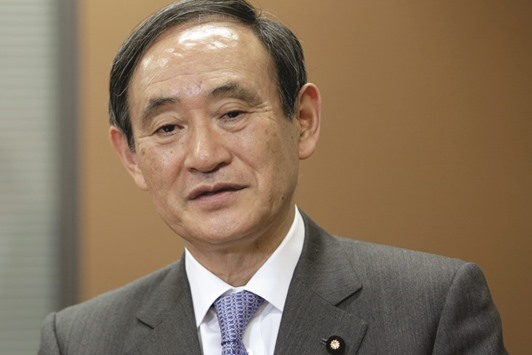Japan’s top government spokesman said the Group of 20’s agreement to avoid competitive currency devaluation does not mean Japan cannot intervene in response to one-sided currency moves.
The Bank of Japan (BoJ) and the government are tensely watching currency markets and the government is prepared to take appropriate steps as needed, Chief Cabinet Secretary Yoshihide Suga told Reuters, but declined to comment on what steps the government was considering.
Japanese Prime Minister Shinzo Abe’s comment to the Wall Street Journal last week that countries should avoid “arbitrary intervention,” was misunderstood and does not rule out intervention for Japan, Suga said.
“What the G20 is talking about is arbitrary intervention, which is different from responding to a one-sided move,” Suga told Reuters in an interview. “The prime minister’s comments were based on the G20 understanding that long-term manipulation of currencies is undesirable.”
The dollar hit a fresh 17-month low versus the yen last week on expectations that the US Federal Reserve will raise interest rates very slowly.
The yen has gained more than 10% against dollar this year, as investors seek the currency as a safe haven.
A rising yen tends to worry government officials because it decreases exporters’ earnings and makes it more difficult to shake off deflation by pushing down import prices.
Japanese authorities last intervened in 2011. At the time, Tokyo got G7 consent to stem a yen spike driven by speculation that a devastating earthquake and nuclear disaster in March would force Japanese insurers to repatriate funds to pay claims.
Some traders have said Japan cannot sell its own currency now, because the G20 warned countries in February to refrain from competitive devaluation.
Suga, who coordinates other ministers in Abe’s cabinet, rejected this idea outright and said Abe’s remarks about arbitrary intervention in a Wall Street Journal interview last week were misunderstood.
The BoJ’s decision in January to adopt negative interest rates has drawn criticism from some countries that say it is a direct attempt to weaken the yen.
The BoJ says it is using negative rates to meet its price target, a move Suga supports. However, some people are worried the policy will erode their savings, so the BoJ needs to carefully explain the impact of its policies, he said.
Suga also rejected the argument that the adoption of negative rates was a sign the BoJ’s attempts to meet its 2% price target had reached a limit.
Abe is meeting foreign economists to prepare to host a summit of G7 finance ministers and central bank governors in May, where he will urge other countries to coordinate policies to accelerate global growth. “The prime minister strongly believes G7 should lead the global economy with sustainable growth,” Suga said.
“The economy will be the most important item on the agenda, so we need to consider what policies are necessary.” Some economists say the G7 summit could pave the way for more fiscal spending by Japan, but Abe is still deciding the best approach for the summit, Suga said.
Japan’s economy could contract for a second consecutive quarter in the January to March period, which would meet the technical definition of a recession and fuel calls for more stimulus. Suga acknowledged that consumer spending was weak, but said an improving labour market and a tourism boom meant the economy remained on track to grow.
Suga reiterated the government’s view that it will raise the nationwide sales tax to 10% from 8% next year as scheduled, but some advisers close to Abe are calling for the plan to be shelved.

Suga: Call to adopt cautious approach in policy.
